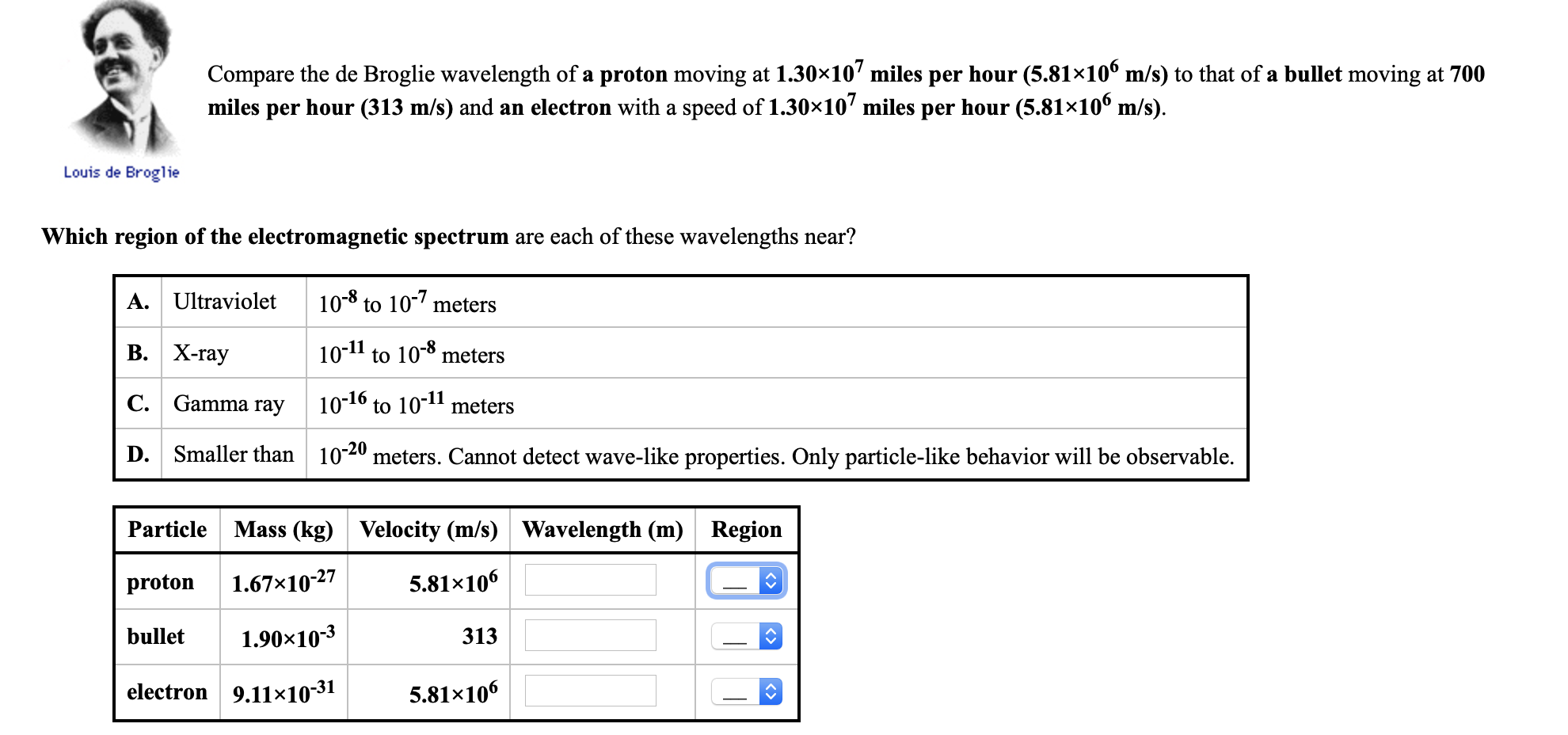Compare the de Broglie wavelength of a proton moving at 1.30×10' miles per hour (5.81×10° m/s) to that of a bullet moving at 700 miles per hour (313 m/s) and an electron with a speed of 1.30×10' miles per hour (5.81×10° m/s). Louis de Broglie Which region of the electromagnetic spectrum are each of these wavelengths near? A. Ultraviolet 10-8 to 10 meters В. Х-гау 10-11 to 10-8 meters C. Gamma ray 10-16 to 10-11 meters D. Smaller than 10-20 meters. Cannot detect wave-like properties. Only particle-like behavior will be observable. Particle Mass (kg) Velocity (m/s) Wavelength (m) Region proton 1.67×10-27 5.81×106 bullet 1.90×10-3 313 electron 9.11×10-31 5.81×106
Compare the de Broglie wavelength of a proton moving at 1.30×10' miles per hour (5.81×10° m/s) to that of a bullet moving at 700 miles per hour (313 m/s) and an electron with a speed of 1.30×10' miles per hour (5.81×10° m/s). Louis de Broglie Which region of the electromagnetic spectrum are each of these wavelengths near? A. Ultraviolet 10-8 to 10 meters В. Х-гау 10-11 to 10-8 meters C. Gamma ray 10-16 to 10-11 meters D. Smaller than 10-20 meters. Cannot detect wave-like properties. Only particle-like behavior will be observable. Particle Mass (kg) Velocity (m/s) Wavelength (m) Region proton 1.67×10-27 5.81×106 bullet 1.90×10-3 313 electron 9.11×10-31 5.81×106
Principles of Modern Chemistry
8th Edition
ISBN:9781305079113
Author:David W. Oxtoby, H. Pat Gillis, Laurie J. Butler
Publisher:David W. Oxtoby, H. Pat Gillis, Laurie J. Butler
Chapter4: Introduction To Quantum Mechanics
Section: Chapter Questions
Problem 32P: Calculate the de Broglie wavelength of the following: (a) electrons that have been accelerated to a...
Related questions
Question
Under region its either A, B, C or D

Transcribed Image Text:Compare the de Broglie wavelength of a proton moving at 1.30×10' miles per hour (5.81×10° m/s) to that of a bullet moving at 700
miles per hour (313 m/s) and an electron with a speed of 1.30×10' miles per hour (5.81×10° m/s).
Louis de Broglie
Which region of the electromagnetic spectrum are each of these wavelengths near?
A. Ultraviolet
10-8 to 10 meters
В. Х-гау
10-11 to 10-8 meters
C. Gamma ray
10-16 to
10-11
meters
D. Smaller than 10-20 meters. Cannot detect wave-like properties. Only particle-like behavior will be observable.
Particle
Mass (kg) Velocity (m/s) Wavelength (m) Region
proton
1.67×10-27
5.81×106
bullet
1.90×10-3
313
electron 9.11×10-31
5.81×106
Expert Solution
This question has been solved!
Explore an expertly crafted, step-by-step solution for a thorough understanding of key concepts.
This is a popular solution!
Trending now
This is a popular solution!
Step by step
Solved in 2 steps

Knowledge Booster
Learn more about
Need a deep-dive on the concept behind this application? Look no further. Learn more about this topic, chemistry and related others by exploring similar questions and additional content below.Recommended textbooks for you

Principles of Modern Chemistry
Chemistry
ISBN:
9781305079113
Author:
David W. Oxtoby, H. Pat Gillis, Laurie J. Butler
Publisher:
Cengage Learning

Chemistry: Principles and Practice
Chemistry
ISBN:
9780534420123
Author:
Daniel L. Reger, Scott R. Goode, David W. Ball, Edward Mercer
Publisher:
Cengage Learning

General Chemistry - Standalone book (MindTap Cour…
Chemistry
ISBN:
9781305580343
Author:
Steven D. Gammon, Ebbing, Darrell Ebbing, Steven D., Darrell; Gammon, Darrell Ebbing; Steven D. Gammon, Darrell D.; Gammon, Ebbing; Steven D. Gammon; Darrell
Publisher:
Cengage Learning

Principles of Modern Chemistry
Chemistry
ISBN:
9781305079113
Author:
David W. Oxtoby, H. Pat Gillis, Laurie J. Butler
Publisher:
Cengage Learning

Chemistry: Principles and Practice
Chemistry
ISBN:
9780534420123
Author:
Daniel L. Reger, Scott R. Goode, David W. Ball, Edward Mercer
Publisher:
Cengage Learning

General Chemistry - Standalone book (MindTap Cour…
Chemistry
ISBN:
9781305580343
Author:
Steven D. Gammon, Ebbing, Darrell Ebbing, Steven D., Darrell; Gammon, Darrell Ebbing; Steven D. Gammon, Darrell D.; Gammon, Ebbing; Steven D. Gammon; Darrell
Publisher:
Cengage Learning

Chemistry: The Molecular Science
Chemistry
ISBN:
9781285199047
Author:
John W. Moore, Conrad L. Stanitski
Publisher:
Cengage Learning


Chemistry & Chemical Reactivity
Chemistry
ISBN:
9781133949640
Author:
John C. Kotz, Paul M. Treichel, John Townsend, David Treichel
Publisher:
Cengage Learning